|
|
|
Sort Order |
|
|
|
Items / Page
|
|
|
|
|
|
|
| Srl | Item |
| 1 |
ID:
099739
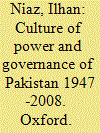

|
|
|
|
|
| Publication |
Oxford, Oxford University Press, 2010.
|
| Description |
xiv, 320p.
|
| Standard Number |
9780195477313
|
|
|
|
|
|
|
|
|
|
|
|
Copies: C:1/I:0,R:0,Q:0
Circulation
| Accession# | Call# | Current Location | Status | Policy | Location |
| 055379 | 954.91/NIA 055379 | Main | On Shelf | General | |
|
|
|
|
| 2 |
ID:
092660


|
|
|
| 3 |
ID:
154604


|
|
|
| 4 |
ID:
188686


|
|
|
|
|
| Summary/Abstract |
This essay is written as an overview of Sikandar Hayat's (1946-) longtime scholarship on the creation of Pakistan with Mohammad Ali Jinnah (1876-1948) as the focal leader. It seeks to bring out the main argument and analyses of Hayat's books on the subject. The main thrust of the essay, consistent with an exposition of Hayat's works, is that the creation of Pakistan was a complex process and that both Jinnah's critics, who often deny him agency, and his uncritical admirers, who exaggerate it out of all proportion, seem to miss the larger historical context and lessons to be derived from Jinnah's life and times. Hayat employs an analytical approach that, among other things, articulates a framework for understanding charismatic leadership in non-Eurocentric environments, restores valid agency to Jinnah, and never loses sight of the context and larger historical forces he, and the All-India Muslim League, had to contend with. As Pakistan marks 75 years of its independent existence, debates and discourses about its creation continue, and Hayat's contributions to that discourse need to be examined and understood outside his own country
|
|
|
|
|
|
|
|
|
|
|
|
|
|
|
|
| 5 |
ID:
148023
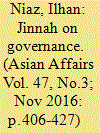

|
|
|
|
|
| Summary/Abstract |
This paper examines the views of Pakistan's founder, Mohammad Ali Jinnah, on a range of issues including sovereignty, civil-military relations, the civil service, industrialization, religion and the state, and national integration. Relying on Jinnah's own views, it reveals that selective engagement with what Jinnah thought has done no favours to Pakistan. Indeed, Pakistan has for all practical purposes, rejected nearly every policy prescription that its founder believed in and effectively repudiated what Jinnah stood for. While much attention has been paid to Jinnah's role in the partition of India or in the politics of the Indian Freedom Movement and the Pakistan Movement, comparatively little has been written about Jinnah's views on governance. This paper tries to initiate the process of filling this gap in the hope of generating a more holistic debate about what Pakistan's founder stood for as a statesman and state builder.
|
|
|
|
|
|
|
|
|
|
|
|
|
|
|
|
| 6 |
ID:
085197
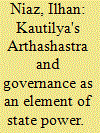

|
|
|
|
|
| Publication |
2008.
|
| Summary/Abstract |
The Indian subcontinent has long been subjected to invasions and extended
periods of warlordism, fragmentation and anarchy. The success of the invading
powers has often depended a great deal upon the prevalence of internal
dissolution. There is a direct link, for instance, between the collusion of certain
Afghan notables, such as the governor of the Punjab, Daulat Khan Lodhi, and the
establishment of Mughal imperial rule in the subcontinent in the 1520s. One can
|
|
|
|
|
|
|
|
|
|
|
|
|
|
|
|
| 7 |
ID:
153007
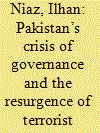

|
|
|
|
|
| Summary/Abstract |
Fifteen years since joining the US-led anti-terrorism coalition, Pakistan’s response to the challenges of terroristic violence and extremist indoctrination and propaganda remain military-centric and kinetic. Since August 2016, after a brief lull, Pakistan has experienced a resurgence of terrorist activity and violence that has struck all of its provinces and placed its capital on high alert. The re-escalation in the level of terrorist violence began with the August 8, 2016, attacks in Quetta, which left over 70 dead and more than 100 injured. The lack of response from the provincial and federal governments to this carnage, led the Supreme Court of Pakistan to exercise its authority under Article 184(3) of the Constitution and establish an Inquiry Commission to examine the state of the investigation and report on the challenges faced in the struggle against terrorism and extremism. This inquiry assumed the form and substance of an audit of the performance of Pakistan’s institutions and exposed the link between the country’s crisis of governance and its incoherent response to terrorism and extremism at all levels of government. The implications of the inquiry report are both broad and deep, and reveal that Pakistan’s trajectory remains that of civilian administrative breakdown and institutional exhaustion. This indicates that Pakistan’s civilian-military balance continues to shift in structural terms in favour of the latter and that beneath a veneer of constitutional democracy, the arbitrary, unwise, and inefficient, exercise of power by the political class continues to hollow out the country’s administrative institutions.
|
|
|
|
|
|
|
|
|
|
|
|
|
|
|
|
| 8 |
ID:
105906
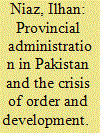

|
|
|
|
|
| Publication |
2011.
|
| Summary/Abstract |
While Pakistani politics regularly employs the rhetoric of provincial autonomy, there are powerful structural and empirical tendencies that have contributed to the centralisation of power. This paper examines the relationship between this concentration of power and the quality of the provincial administration. It argues that unless the provincial administration is rehabilitated and a real measure of fiscal autonomy is granted to the provincial units, Pakistan will continue to suffer a state apparatus and political process that is centralised, arbitrary and ineffective. The effectiveness of the Pakistani state apparatus has become a matter of international concern due to the US-led war on terror and the spill-over of the Taliban/Al-Qaeda insurgency into Pakistan. It is contended that fixing the problems inherent in Pakistan's administration require not only material inputs, but a change in attitude and orientation towards the provincial administration.
|
|
|
|
|
|
|
|
|
|
|
|
|
|
|
|
| 9 |
ID:
175071
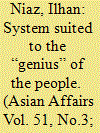

|
|
|
|
|
| Summary/Abstract |
In recent months there has been an effort to reignite debate about the suitability of a federal parliamentary system and argue that it needs to be replaced by a centralized presidential form of government. This has led to sharp reactions from those who favour a continuation of parliamentary government in Pakistan especially with regard to the strong federal provisions of the Eighteenth Amendment (2010) to the Pakistani Constitution, which granted greater autonomy to the provinces and undid many of the changes imposed by military rulers. This paper examines the original version of this debate from Pakistan's experience in the 1950s and 1960s with the aim of identifying and discussing the rationales of those in favor of a presidential Pakistan and the price that the country paid for undermining parliamentary government.
|
|
|
|
|
|
|
|
|
|
|
|
|
|
|
|
|
|
|
|
|